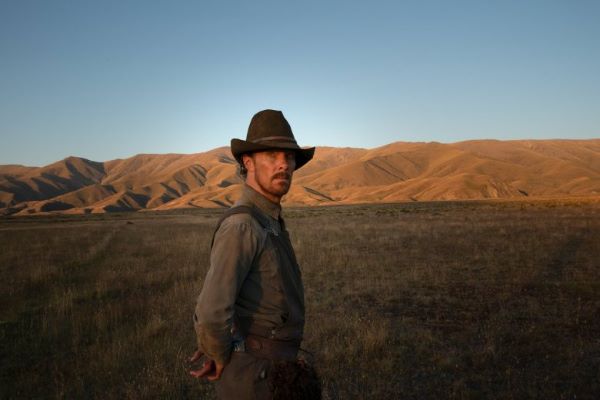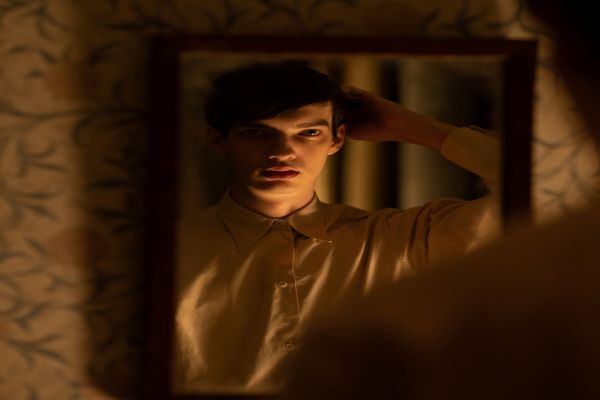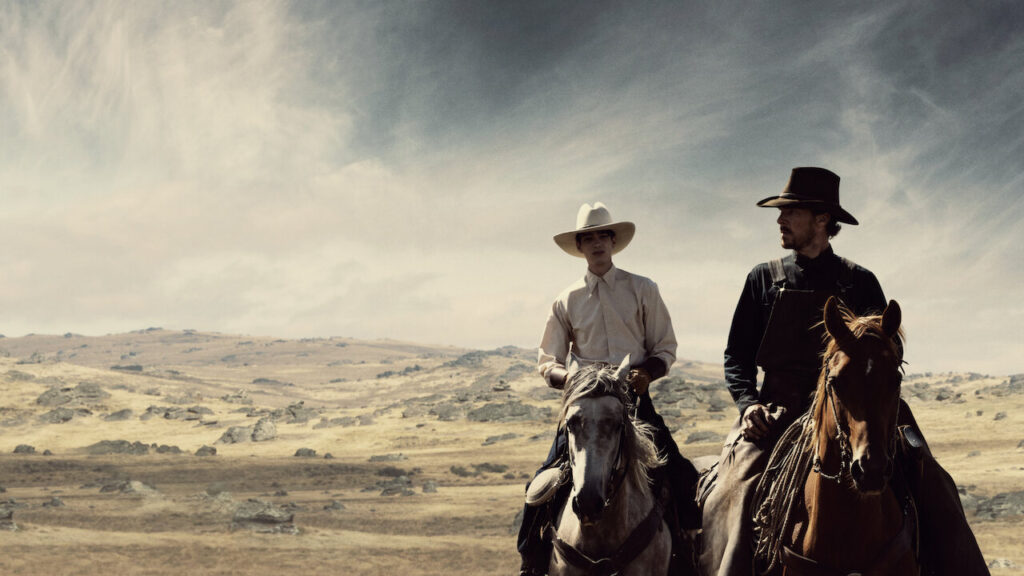Jane Campion’s The Power of the Dog is a wonderful western film as well as detailed psychodrama. Campion has shot the film in New Zealand but the visuals are not disconnected from the American west. The film mostly shows how the power of masculinity dominated the American West in the early 20th century. However, this is not simply a mundane cowboy story. The Power of the Dog deals with serious psychological issues like masculinity, male ego, hatred, revenge, jealousy, insecurity, resentment, and also love. Without showing any sex scenes, Campion has made a highly erotic film. Without firing a single bullet, she has made a glorious western film.
Burbank brothers Phil (Benedict Cumberbatch) and George (Jesse Plemons) are wealthy ranchers in 1925 Montana. George is calm and sober but Phil is hotheaded and has a strong male ego. They enter an inn during a cattle drive. A widow named Rose Gordon (Kirsten Dunst) runs the inn along with her son Peter (Kodi Smit-McPhee). George falls in love with her and subsequently ties the knot. Phil is utterly aggressive to Rose and her son Peter and taunts them whenever he gets an opportunity. He mocks Peter’s effeminate behavior in front of his ranch workers. Rose moves into the Burbank household and sends Peter to college to study medicine, which irks Phil and he thinks that Rose has married George only for money. George invites his parents and the Governor to introduce Rose and she plays a few notes of “Radetzky March” on the Piano. Phil plays the same tune on his banjo and demeans her. Phil’s continuous insults make Rose utterly hurt, tormented, and broken. She gets addicted to alcohol.

Peter comes to stay with his mother during the summer holidays. Phil keeps mocking him in front of his ranch workers. Peter secludes himself in a room and practices animal dissection. One day, Peter discovers Phil masturbating and bathing with Bronco Henry’s handkerchief. He goes a little forward and finds out a small place in the woods full of magazines that cover nude photographs of men. Phil sees and chases him. After this incident, he starts behaving properly with Peter. Phil teaches him horse riding and wants to gift him a lasso. The growing connection between Peter and Phil disturbs Rose and she becomes more alcoholic.
Peter collects rawhide from a dead cow wearing gloves. Rose sells off the extra hides to indigenous people, which irks Phil. However, he is happy when Peter offers him his hide without informing him that he collected it from a dead cow. During a fencing job, Phil gets a wound in his hand while catching a rabbit. Phil and Peter remain awake at night, and Phil makes the lasso. The next day, he is ill and George takes him to a doctor. Later, his coffin is seen being prepared for the funeral. The doctor informs George that Phil might have died due to Anthrax. George is surprised as Phil would never extract hides from a dead cow. Peter opens a Book of Common Prayer and reads psalm 22:20 “Deliver my soul from the sword; my darling from the power of the dog.” The film ends with Peter seeing George and Rose embrace each other.

Jane Campion’s The Power of the Dog is not a simple western film. There are multiple layers underneath it. During the 1st half of the film, viewers get to know Phil as a hotheaded and strong male ego-centric cowboy who always insults Rose, mocks Peter, and is deeply inspired by Bronco Henry. He is portrayed as a typical cowboy who does not bathe every day and stinks. The influence of strong masculinity makes him hate Rose. His sexuality is not touched upon. However, in the 2nd half, Peter discovers him masturbating and bathing with Bronco Henry’s handkerchief. Peter also discovers a small closed place full of magazines covering male nude photos. For the first time, viewers get to know Phil as gay. He tries to build a relationship with Peter like he had with Bronco Henry. Filmmaker Jane Campion has masterfully portrayed his sexual repression in the film.
The Power of the Dog is a multilayered film. It raises multiple questions but does not answer those. Is Phil’s death a mere accident or murder? Does Peter deliberately hide the fact that the rawhide was extracted from a dead cow? Does he avenge all the insults to his mother? He reads psalm 22:20 “Deliver my soul from the sword; my darling from the power of the dog.” Is he referring to his mother Rose as darling and Phil as a dog? Or is he referring to himself as darling and Phil as a dog? The above two questions are true if he has killed Phil with the rawhide. But if it is a mere accident, then he is probably referring to Phil as darling and his hardships as the power of the dog. The film does not answer all these questions.
Jane Campion’s masterful direction has made The Power of the Dog a multilayered and dynamic film. Her screenplay, which is based on Thomas Savage’s novel of the same name, is detailed, full of masculinity, but then suddenly turns into a super erotic film. One of the most important aspects of the film that must be mentioned is Jonny Greenwood’s music. The background score is almost always filled with tension. It also resonates with the sufferings of Rose and her son Peter. It portrays the moods and feelings of the characters at any moment. Ari Wegner’s magnificent cinematography depicts mountainous Montana in New Zealand. The visuals efficiently and perfectly portray 1925 Montana. Phil’s anger, taunting, masculinity, intolerance, and also warmth are reflected in Benedict Cumberbatch’s brilliant acting. Kirsten Dunst and Jesse Plemons have played their roles well. Kodi Smit-McPhee as Peter is extremely dynamic. He plays a very strong character that initially looks effeminate and vulnerable. The Power of the Dog was screened in competition at the 78th Venice International Film Festival where director Jane Campion won the silver lion for Best Director. The film has received seven nominations at the 79th Golden Globe Awards.
